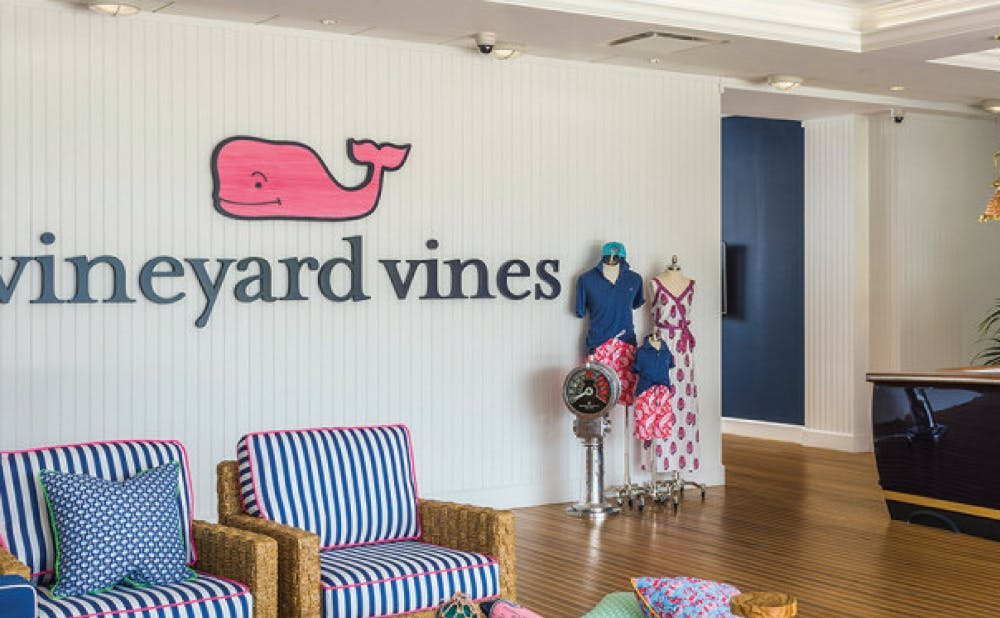On a hot Carolina summer afternoon, in the shadow of a slowly deteriorating barn, a sea of pastel ripples like a field of Dutch tulips in a light breeze. And call me Ishmael, because this sea is full of whales.
Vineyard Vines is to Duke what an unneutered dog is to your local park: f***ing everywhere. The whales swim the corridors of West Union, come up for air in the main quad and hunt the floors of frat houses. You may even find them sitting in a pack in your Econ lecture or waving their hands in the air whilst sitting atop the highest possible peak at a darty. But what exactly are these mysterious creatures and how did they come to be so ubiquitous?
Vineyard Vines is an upscale clothing brand inspired by the culture of New England vacation island Martha’s Vineyard. Everything about the brand screams sailing, fishing and waiting for the grandma that never hugged you to die so you can get your portion of the inheritance.
The brand was founded in 1998 by two white dudes named Shep and Ian who like to put quotes on their website like “We had plenty of doors slammed in our faces, but it’s like they say: When one door closes, go in through the window” or “We weren’t selling our ties. We were selling our stories.” The two brothers grew up in Connecticut and spent every summer in Martha’s Vineyard. In the late nineties, they grew tired of their Manhattan desk jobs and decided to, as they put it, “trade in our business suits for bathing suits by selling ties so we wouldn't have to wear them.” Cool.
They started out by selling colorful ties depicting “icons of the good life” (sailboats, martinis, cigars, etc.) and over the next twenty years grew the company to have approximately 70 locations across the United States. As Drake once said: “Started from the upper-middle now we’re here.”
Jokes aside, as far as I can tell Vineyard Vines seems to be a morally-run company with the wholesome motto of “Every day should feel this good.” But what the company intends its reputation to be is completely different from what it has become in the context of Duke (and other universities for that matter).
When I think of Vineyard Vines, I think of East Coast money, entitlement and elitism. Additionally, since so many of those who choose to wear Vineyard Vines are also involved with Greek Life on campus, it has come to be heavily associated with that subculture and its many problematic practices.
Vineyard Vines is by no means the only upscale clothing company to embody an elitist culture. All brands make a statement, all brands have a reputation. But no brand makes a louder statement than Vineyard Vines. It’s pretty hard to not notice someone wearing a Vineyard Vines shirt when there’s a giant pink whale plastered across their back. Even the shirts with smaller logos are impossible to miss because no other clothing company would dare to put so many aggressively bright and clashing colors on one polo.
That brings me to another equally frustrating conclusion. If you’re going to spend seventy dollars on a polo shirt, why buy one that looks like it was designed by Dr. Seuss? I’m not one to buy into ridiculously priced clothing regardless, but at least brands like Chanel and Gucci have some claim to it being high fashion. In my opinion, Vineyard Vines…actually scratch that. Vineyard Vines clothing is objectively ugly.
For this reason, I only see one explanation as to why so many people choose to wear Vineyard Vines, and that is to advertise—be it truthfully or falsely—that they come from money. Some may do this consciously, others more subconsciously, but I highly doubt anyone at Duke just happened to stumble into a Vineyard Vines store and buy a polo because they thought it looked cool without knowing anything about the brand or its reputation.
It’s hard to blame people who do this. For many people coming into Duke, Greek life is the end-all-be-all when it comes to having a social life. Greek life rewards fitting in, not standing out, and as much as Duke has increased its diversity over time, the upper echelons of its social hierarchy (if you choose to buy into that notion) remain primarily a playground for the rich.
All this is not to say that anyone who wears Vineyard Vines is a bad person. As tempting as it can sometimes be to judge a book by its cover, just writing this I’ve been thinking about all the great people I know who choose to wear Vineyard Vines on occasion who I might need to have an awkward conversation with if they happen to read this article. At the end of the day what you choose to wear says next to nothing about who you really are as a person.
This is also not a call to action to burn all of your Vineyard Vines clothing. Wear whatever you want. I’m just one overly opinionated college sophomore with a column making a statement. A statement that is far less obnoxious and sh*tty than owning 3 mint-colored, whale-themed long-sleeve tees.
Sami Kirkpatrick is a Trinity sophomore. His column runs on alternate Wednesdays.
Get The Chronicle straight to your inbox
Signup for our weekly newsletter. Cancel at any time.
Sami Kirkpatrick is a Trinity sophomore. His column, "worms in space," runs on alternate Wednesdays.

